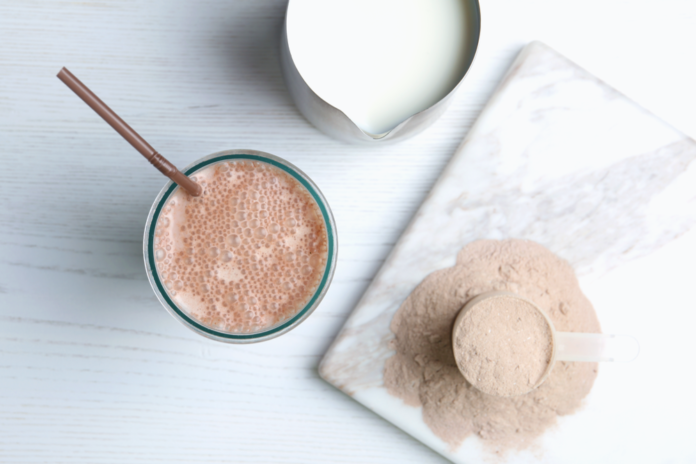Does “nutrition in a bottle” really benefit an aging body? Do protein shakes work?
Understanding the pros and cons of protein powder, protein pills, and protein supplement pills is important before choosing the best option to support overall health.
Read on to discover the truth about protein shake diet results and more, including five prime benefits of consuming protein as a senior.
Why Is Protein Important For Older Adults?
Protein is extra important for the elderly. While aging is a natural process, it does take a toll on the body. Luckily, paying attention to sources and intake of protein can support a healthy aging process.
1. Supports Overall Health & Wellness
A diet sufficient in protein is imperative for many reasons, regardless of age or fitness level. Seniors need the right amount of protein in order to maintain:
- Muscle strength
- Balance
- Agility
- Resilience
Protein acts as a potent “building block” for the body. They essentially stimulate building processes, and they aid in nearly every cell and body process. Especially for seniors, protein can help ease the aging process and maintain health in a way that minimizes risk.
2. Aids Digestion
With age, digestion slows down. Protein powder is much easier to digest than its more meaty alternatives. Protein provides a crucial function by balancing hormones and digestive enzymes involved in the digestion process.
It is worth looking closely at the ingredients list before deciding between options. For example, casein protein powder is especially slow-digesting. Protein helps the body to feel full for longer, and slow-digesting proteins especially can support a lingering feeling of fullness.
3. Improves Muscle Mass
Loss of muscle mass is normal in older adults. Sometimes this phenomenon can be linked to diminished strength or health issues.
Protein helps to counteract loss of muscle mass. Crucial to muscle repair and regeneration, protein also helps to promote recovery after exercise.
4. Supports The Body On A Cellular Level
Each and every cell in the body uses protein to function. The following body systems and parts, for example, need protein to function properly:
- Skin, hair, and nails
- Bones
- Internal organs
5. Facilitates Several Body Processes
Protein also aids in many body processes, such as:
- Healing from surgery, illness, or injury
- Keeping fluid levels in balance
- Maintaining healthy vision
- Balancing hormones
Are Protein Shakes Good For Older Adults?
Protein shakes can be a great option for older adults. When considering options, it is important to recommend a protein powder that suits the needs of seniors.
Older adults have different nutritional needs than other groups. Factors beyond age, such as exercise, can affect the amount of protein an elderly person needs. Protein shakes or supplements can be a powerful part of the elderly diet that helps fill any nutritional gaps.
Research suggests that seniors are not as able to use protein as younger people. In other words, senior bodies may require more protein to meet their needs. Studies also show that older adults may not be getting the recommended amounts of protein.
Sufficient protein, eating enough calories, and incorporating balanced exercise options can all help in building muscle and preventing unintended weight loss. Getting enough protein is also a vital part of avoiding malnutrition.
The main message for seniors is that there is not one “right” protein. High-quality ingredients are something every senior should look for, but beyond that needs may differ.
Not all proteins are created equal. Consider all the options and discuss the pros and cons with a doctor and dietitian to discover the one that is the best option for overall health and wellness.
Pros
Individual needs for protein can vary, making protein powders and shakes a great option for some seniors. Potential benefits of protein powders, shakes, and supplements include:
- Some can be mixed into water, coffee, milk, tea
- Convenient and quick
- Easy to digest
- Can help meet general health and wellness goals, as well as nutrition needs
- Excellent, fortified alternative for vegans and vegetarians
- Can increase feeling of fullness, help slow digestion of carbohydrates (carbs), and even stabilize blood sugar levels
- Liquid consistency
- Adds variety to the diet
Cons
Often, whole foods are a dietitian’s first choice for seniors. Some older adults may find that protein powders are not a great option for them for the following reasons:
- Not always available in multiple flavors
- Some powder mixes contain sugar (many not be best for those monitoring carbohydrate intake)
- Can be expensive
- May contain possible contaminants
- Phytates (in plant-based powders) may become problematic to some
- Can cause digestive distress
- Can be high in added sugars and calories
- Can inhibit hunger cues
- Negative side effects like constipation, diarrhea, vomiting and nausea
- Easily over or underused
Another drawback of protein powders and supplements is that there is limited data on the long-term effects.
Supplemental Protein Sources
Protein supplements, powders, and shakes can be an easy and quick way to boost protein. There are two main types of protein found, including plant-based and animal-sourced.
1. Plant-Based
Plant-based protein sources are commonly called “incomplete”. This is due to the fact that they contain some amino acids (the “building blocks” of protein), but not all that the body needs. Plant-based options include:
- Soy protein
- Pea protein
- Hemp protein
- Brown rice protein
- Peanut protein
- Almond protein
- Nut protein
- Seed protein (i.e. pumpkin seed)
- Mixed plant proteins (may contain nuts, seeds, peas, lentils, legumes, etc.)
However, plant-based options can be great for those with dietary preferences or allergies that rule out animal-sourced items. When including plant-based nutrition in the diet, be sure to eat a variety of plant-based proteins throughout the day. This ensures that the body stays fueled and continues to receive the protein it needs to optimally function.
2. Animal-Sourced
Animal-sourced protein is another excellent option, especially for those who need more “complete” proteins. Containing all of the amino acids, protein sourced from meat, eggs, or dairy may be a great way for older adults to get the essential nutrition that they need.
Protein powders from animal sources include:
- Milk proteins (casein and whey)
- Egg protein (including egg white protein)
- Beef protein
- Goat protein
Both of these options can provide nutritionally adequate sources of protein for a senior’s diet. Often, the decision between plant or animal-based options is made based on preference. Dietary intolerances may also necessitate that one option is chosen over the other.
Each option has its pros and cons. No matter which one is chosen, it is crucial to seek out high-quality ingredients. Try and opt for items with:
- No artificial additives
- Whey sourced from grass-fed cows (higher quality protein)
- Balanced amounts of carbohydrate and fat
- Little to no added sugar, salt, or additives
- Third-party certification (i.e. NSF)
- Contains extra vitamins or probiotics
- Mixes easily with milk, milk alternatives, or water
Whey Protein Powder For Older Adults
Whey protein, in particular, has long been used as a protein supplement for exercise enthusiasts to build muscle. Recent research, however, suggests seniors may benefit as well. Many studies share results indicating that whey protein may be most effective for seniors that are struggling to rebuild muscle.
When looking for the right protein, whey may be a great option for seniors who have muscle loss as a result of:
- Inactivity
- Illness
- Long hospital stays
It is important to note that these studies showed that activity plus protein supplementation are what rebuilt muscle. Lean muscle mass loss did not stop on its own due to whey protein supplementation. Whey did, however, help to rebuild muscle at an excellent rate once the older adults resumed activity.
Whey protein typically comes in three varieties:
1. Isolate
Isolate indicates that the protein comes from a source that is a whole food. It also means that the powder is filtered to remove trace contaminants or other unwanted components. In other words, isolate offers a very pure form of whey protein.
2. Concentrate
Whey concentrate is exactly what it sounds like. The concentrate is a concentrated source of protein. It is lower in nutritional value than the other options, but it is a more affordable product.
3. Hydrolyzed Whey Protein
Hydrolyzed whey is a favorite of many because it is the easiest to digest. Hydrolyzed whey protein goes through a special process to make it better able to be absorbed by the human body. The only downside? It is more expensive as an end product.
The great thing about these different options is that they sometimes overlap! For example, hydrolyzed whey protein isolate exists and is a high-quality choice for someone needing a pure and absorbable product.
Protein Shake Recs for Older Adults
Dietitians recommend considering a protein shake or supplement when protein needs are not met through food alone. When looking for a good fit, try finding supplement options that are sourced from real food sources
Remember, each of these options can be great but there can be “too much of a good thing”. Protein supplements can make it easier to provide too much protein in the diet.
Keep in mind that protein shakes and supplements provide a very concentrated dose of protein. Consider what it is being mixed with as well to help balance the nutrition that protein powders or pills provide.
The following items may be a great option for supplying protein in a senior’s diet. Each category lists the best options for different senior needs.
High Quality Ingredients
- Transparent Labs 100% Grass-fed Whey Protein Isolate
- OWYN Only What You Need 100% Vegan Plant-Based Protein Shakes
Affordable & On-The-Go Options
- Ladder Whey Protein
- Orgain Clean Protein Grass Fed Protein Shake
- Fairlife Core Power Protein Shakes
At Least 25 Grams Of Protein (or More)
- Transparent Labs 100% Grass-fed Whey Protein Isolate
- Ladder Whey Protein
- Opportuniteas Grass-Fed Whey Protein Isolate
- Isopure Zero Carb Protein Powder
- Muscle Milk Smoothie
These options have at least 30 grams of protein, but they also may contain additives and added sugars:
- Bolthouse Farms Protein Plus
- Premier Protein
- Pure Protein Complete Protein Shake
Available In Bulk
- Pure Whey Grass-Fed Whey Protein Powder
- Vega One Organic All-in-One Shake, French Vanilla
- FitPro GO! Lactose Free Real Milk Protein Shake
- ICONIC Protein Drinks
Protein shakes can be great at increasing protein consumption. However, other goals, such as weight loss or diabetes management, may necessitate a closer look at the label.
Protein For Seniors with Diabetes
For weight loss, find shakes with:
- No added sugars
- No dextrins/maltodextrins (sweeteners that are made from starch)
- No added branched-chain amino acids (BCAAs)
Elderly people who want to lower carbohydrate levels or people who are cutting back on sugar should avoid the following options:
- Ladder Whey Protein
- Ensure Original Nutrition Powder and Ensure Plus Nutrition Shake
- Orgain Organic Protein, Vanilla Bean
- Slimfast Original
- Bolthouse Farms Protein Plus
Keep in mind that options like Glucerna and Naked can be sneaky. They offer a “carb steady” product which trades glucose for fructose.
While fructose does not raise blood sugar levels like glucose does, high fructose is thought to induce fat gain and inflammation. It is not able to be used by the body to replace glucose-based energy stores.
Options with low carbs, no carbs, or that use sweeteners lower on the glycemic index include:
- Isopure Zero Carb Protein Powder
- Nutiva Organic Hemp Seed Protein
- Garden of Life Raw Organic Protein
- SunWarrior Classic Plus
- ICONIC Low Carb High Protein Drinks
GI Discomfort or Kidney Disease
Those with kidney disease cannot tolerate a ton of protein at once. It is ideal for kidney disease patients to stay between 5-15 grams of protein per serving if possible. The following options contain a lower range of protein content for those with digestive or absorptive issues.
For some older adults who do not have to manage these issues, only supplementary amounts of protein are needed. Lower doses of exercise and average nutritional needs can be met with the following formulas.
Contains 5-25 grams of protein:
- Ensure Original Nutrition Powder
- Pure Whey Grass-Fed Whey Protein Powder
- HUM Core Strength Protein Powder
- Orgain Organic Protein Powder
- PlantFusion Complete Protein Powder
- Harmless Harvest Protein Plant Based Smoothie
- Isopure Cocotein Coconut Infused Protein Drink
Those with gastrointestinal problems, such as irritable bowel syndrome (IBS) or lactose intolerance, will want to find protein powders or supplements without:
- Lactose sugars
- Artificial sweeteners
- Dextrins/maltodextrins
- Allergens (i.e. gluten)
Top Allergen-Free
- ALOHA Organic Plant Based Protein Shake (dairy-free)
- Koia Ready to Drink Plant Protein Shake Vanilla Bean (gluten-free)
- FitPro GO! Lactose Free Real Milk Protein Shake
Top Vegan Options
- Nature’s Best Plant-Based Vegan Protein Powder (by Isopure)
- Vega Protein Nutritional Shake
- OWYN Only What You Need 100% Vegan Plant-Based Protein Shakes
For improved taste and nutrition:
- Mix with milk
- Mix with milk alternative
- Add a serving of fruit
- Add a tablespoon of peanut butter
The Bottom Line on Protein Powders & Shakes
Protein is a crucial nutrient for older adults. Nutritional needs can be met through food usually, but sometimes a protein shake, powder, or supplement can substantially improve the dietary pattern.
The right shake or supplement can add delicious protein while also improving overall health and wellness for an elderly loved one.
References:
Dodd K. Protein Requirements for Older Adults. The Geriatric Dietitian. Published September 29, 2020. https://www.thegeriatricdietitian.com/protein-requirements-for-older-adults/.
Hancocks N. Morning protein shake: Good for elderly but maybe not for weight loss. Nutra Ingredients. Published November 2, 2020. https://www.nutraingredients.com/Article/2020/11/02/Morning-protein-shake-Good-for-elderly-but-maybe-not-for-weight-loss.
Harvard Health Publishing. The hidden dangers of protein powders. Harvard Health. Published April 10, 2020. https://www.health.harvard.edu/staying-healthy/the-hidden-dangers-of-protein-powders.
Health Essentials. How to Choose the Best Protein Powder for You. Cleveland Clinic. Published June 12, 2020. https://health.clevelandclinic.org/7-tips-choosing-best-protein-powder/.
Healthline Editorial Team. Whey Protein Shakes May Help Build Muscle Mass in Seniors. Healthline. Published August 1, 2017. https://www.healthline.com/health-news/whey-protein-shakes-may-help-build-muscle-mass-in-seniors.
Hultin G. Plant Protein Powders. Today’s Dietitian. Published March 2020. https://www.todaysdietitian.com/newarchives/0320p16.shtml.
Jo C. 20 Ways To Get Your Elderly Parents to Eat More Protein With Their Meals. Home Care Assistance. https://homecareassistance.com/blog/protein-tips-for-senior-diet.
McMaster University. Ideal protein to help seniors rebuild lost muscle. Science Daily. Published October 9, 2018. https://www.sciencedaily.com/releases/2018/10/181009135938.htm.
Savage E. The 8 Best Protein Shakes of 2021, According to a Dietitian. Verywell Fit. Published June 24, 2021. https://www.verywellfit.com/best-protein-shakes-4169381.
Sellers C. Best Protein Powder for Elderly & Seniors. Total Shape. Published May 24, 2021. https://totalshape.com/supplements/best-protein-powder-for-elderly/.






